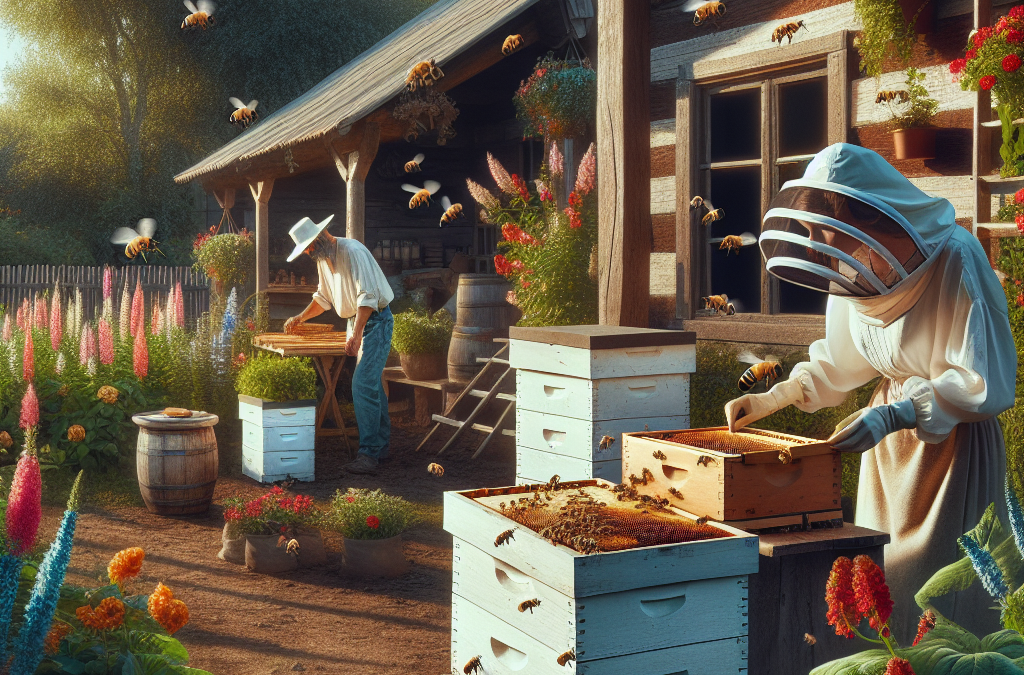Enhancing Your Garden’s Productivity
Pollination Power
One of the first things I noticed after starting my beekeeping journey was the remarkable impact on my garden. Bees are some of the best pollinators out there. Having hives nearby means your fruits and veggies aren’t just thriving—they’re flourishing. I saw more tomatoes and cucumbers than I ever had before!
It’s not just about quantity, though. The quality of the produce gets a serious boost, too. When bees pollinate flowers, it increases the variety of plant life. This isn’t just good for our plates; it’s great for overall biodiversity. My garden now looks like a tiny paradise filled with vibrant colors and an array of tasty goodies.
Plus, if you think about it, having your own pollinator squad is an eco-friendly choice. You’re reducing the need for artificial fertilizers and sprays. Instead of relying on a gardener’s best friend—chemical sprays, I get to watch nature do its thing!
Beeswax: Nature’s Versatile Resource
Crafting and DIY Projects
When I first started keeping bees, I had no idea how much I would fall in love with beeswax! It’s incredibly versatile. I’ve used it for making candles, lip balms, and even beauty products. Trust me, blending nature with creativity adds a whole new dimension to homesteading.
Creating homemade candles from beeswax is such a rewarding experience. Unlike paraffin, beeswax burns cleaner and longer, and the subtle honey scent is just divine. Plus, gifting them to friends and family lets me shine with my newfound skills—and who doesn’t love a handmade gift?
After dabbling in DIY crafts, I also discovered using beeswax as a natural food wrap. I feel great knowing I’m reducing plastic waste while keeping my food fresh. You simply melt the beeswax with cotton fabric, and voilà—eco-friendly food storage!
Health Benefits of Honey
Nature’s Sweetener
Let’s get real: honey is not just delicious; it’s also packed with health benefits. I’ve always had a jar or two at home, but after diving into beekeeping, I found myself reaching for it more often. It’s a natural sweetener that can replace refined sugar. How great is that?
Honey has antibacterial and anti-inflammatory properties, making it a perfect remedy for a sore throat or a nasty cough. I always keep some handy in the winter months when those colds hit. Just a spoonful in hot water or tea works wonders!
Moreover, there’s also the joy of experimenting with different types of honey. From wildflower to orange blossom, each has its unique flavor profile. You’ll find yourself sipping tea differently when you realize how much honey can enhance each cup. It truly is a tasty adventure!
Beekeeping as a Hobby
Stress Relief
I’ve learned that beekeeping isn’t just about the bees or the honey—it’s a form of therapy. There’s something incredibly calming about watching bees go about their business. When I’m out in the yard, it’s like the weight of the world slips away. I can’t recommend it enough if you’re looking for that chill-out vibe!
The routine of caring for bees helps with mindfulness. It brings me back to the here and now, where I’m focused on my little buzzing friends rather than the chaos of daily life. Opening a hive is like entering a new world, full of activity and purpose. You can’t help but feel a deep connection to nature.
Plus, it’s super rewarding. Every time I extract honey or simply observe the hive’s inner workings, it reminds me of life’s delicate balance. It brings a sense of accomplishment that countless other hobbies just can’t match. Seriously, give it a go!
Community and Connection
Joining a Beekeeping Community
Getting into beekeeping has connected me with a whole new tribe. Once I started, I quickly found that there are so many folks out there who share the same passion. Joining local beekeeping groups has made me feel part of something larger—a real community.
The gatherings are filled with knowledge-sharing, laughter, and sometimes a little competition over who has the best honey! It’s amazing how bonding over bees can spark friendship. Plus, I’ve learned so much from seasoned beekeepers who are eager to share their tips and tricks!
And let’s not forget those community events where we all come together to promote sustainable practices. It feels good to contribute to a cause that matters. Not only does it help the environment, but it also cultivates a spirit of support that enriches our communities.
Conclusion
So, there you have it! Whether you’re looking to boost your garden, enjoy a natural resource, benefit your health, find a relaxing hobby, or connect with like-minded folks, beekeeping has something to offer everyone. I highly encourage anyone to give it a try. You never know—it might just be your next favorite adventure!
FAQs
1. How much space do I need for beekeeping?
Not much! You can start with just a small backyard. Make sure there’s plenty of forage nearby, and you’re good to go.
2. Is it expensive to start beekeeping?
It can be a bit of an upfront investment for equipment like hives and protective gear, but many find the rewards valuable!
3. Do I need special training to keep bees?
While it’s always helpful to take a beekeeping class or read books, many people learn as they go. Just be sure to stay informed!
4. Can I keep bees if I’m allergic to them?
If you have a known bee allergy, it’s best to consult with a doctor and consider if beekeeping is the right fit for you.
5. How do I harvest honey?
Harvesting honey involves checking the hive, using an extractor or crush-and-strain method, then bottling it. There’s a bit of a learning curve, but it’s super rewarding to savor your results!





